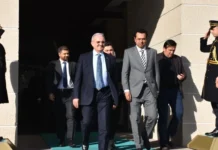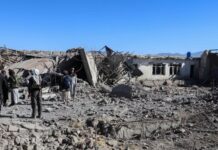ISLAMABAD, Aug 5 (Alliance News): Pakistan on Tuesday strongly rejected Ukrainian President Volodymyr Zelensky’s accusations that Pakistani nationals are involved in the Ukraine-Russia conflict, terming them “baseless and unfounded.”
The Ministry of Foreign Affairs issued an official statement in response to President Zelensky’s remarks, asserting that no credible or verifiable evidence has been shared to support such claims.
The Ukrainian president, during a recent visit to frontline positions in the Kharkiv region, alleged that foreign mercenaries—including individuals from Pakistan, China, Tajikistan, Uzbekistan, and certain African countries—were fighting alongside Russian forces.
“We spoke with commanders about the frontline situation, the defence of Vovchansk, and the dynamics of the battles,” Zelensky said in a post on social media platform X.
“Our warriors in this sector are reporting the participation of mercenaries from China, Tajikistan, Uzbekistan, Pakistan, and African countries in the war. We will respond.”
Reacting to these comments, the Pakistani Foreign Office made it clear that such accusations were not only speculative but damaging to diplomatic relations.
“The Government of Pakistan categorically rejects the baseless and unfounded allegations of the involvement of Pakistani nationals in the conflict in Ukraine,” the statement said.
It added that Pakistan has never been formally approached by Ukrainian authorities on this issue, nor has it received any proof to substantiate these serious claims.
The FO emphasized that the Pakistani government is committed to international peace and does not support the participation of its nationals in any external conflict.
“To date, Pakistan has not been formally approached by the Ukrainian authorities, nor has any verifiable evidence been presented to substantiate such claims,” the statement read.
It also highlighted that Islamabad would raise the matter through diplomatic channels and seek formal clarification from Kyiv.
The Foreign Office reiterated Pakistan’s longstanding position on the Ukraine crisis, reaffirming its commitment to the peaceful resolution of the conflict.
It called for an end to hostilities and emphasized the importance of dialogue and diplomacy, aligning its stance with the principles outlined in the United Nations Charter.
“Pakistan remains committed to a peaceful resolution of the Ukraine conflict in accordance with the UN Charter and urges all parties to engage in constructive dialogue,” the statement concluded.
President Zelensky’s remarks come at a time when tensions remain high on the battlefield and allegations of foreign involvement have been frequently used as tools in the information war between Russia and Ukraine.
The Ukrainian leader has previously made similar claims about foreign nationals aiding Russian forces, including accusing China of allowing its citizens to fight in Russia’s ranks—a claim Beijing has consistently denied.
North Korea has also been named in past accusations, with suggestions that thousands of its troops are present in Russia’s Kursk region, although such claims remain unverified by independent observers.
While Pakistan has consistently maintained a policy of neutrality in the Ukraine conflict, it has been previously drawn into geopolitical speculation.
In the past, some media reports in Western outlets alleged that Pakistan may have supplied ammunition to Ukraine via third-party nations.
Islamabad, however, has repeatedly denied these allegations, asserting that it has not provided any military assistance to either side and that all its arms exports follow strict end-user agreements.
Foreign policy analysts in Islamabad argue that President Zelensky’s statement may be politically motivated and part of a broader narrative intended to pressure countries perceived as non-aligned.
“Such claims without evidence not only damage bilateral relations but also complicate the broader goal of achieving peace through diplomacy,” said a senior diplomat on condition of anonymity.
The allegations also sparked reactions from political commentators and security experts in Pakistan. Many emphasized the need for the government to issue a firm diplomatic protest while continuing to work with international partners to clarify the record.
“If the Ukrainian side has any credible intelligence, it must be shared through formal diplomatic channels rather than announced through social media posts,” remarked a former ambassador.
At the same time, some voices within Pakistan have called for a more proactive engagement with both Ukrainian and Russian authorities to ensure that Pakistan’s position is not misrepresented in international forums.
They argue that as a nuclear-armed country and an emerging regional player, Pakistan must guard against becoming entangled in conflicts where it has no stake.
Islamabad’s immediate focus, however, remains on damage control. The Foreign Office has reportedly instructed its missions in Europe to monitor developments and be prepared to counter any narrative suggesting Pakistan’s involvement.
Additionally, the Pakistani Embassy in Kyiv is expected to initiate communication with the Ukrainian Ministry of Foreign Affairs to obtain an official explanation.
As the war in Ukraine enters another difficult phase, with no diplomatic breakthrough in sight, Pakistan continues to call for restraint and dialogue. The country maintains that lasting peace can only be achieved through mutual respect for sovereignty, territorial integrity, and adherence to international law.
In the coming days, Pakistan’s diplomatic machinery is likely to remain active in international circles, reiterating its neutral stance and seeking to prevent any further escalation stemming from what it considers unfounded claims.
The FO’s clear and categorical denial signals Islamabad’s intent to preserve its diplomatic credibility and avoid being drawn into a distant conflict with complex geopolitical dimensions.






